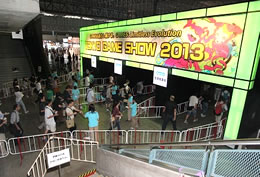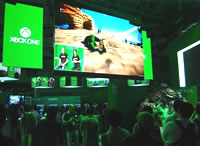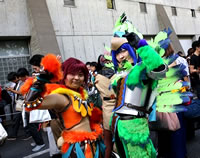Business Opportunities
Tokyo Game Show 2013

A Major Event in the World of Gaming
Makuhari Messe, Chiba, Japan
September 19-22, 2013
Tokyo Game Show 2013 Greatly Expands Venue Space for New Exhibits and Projects
The Tokyo Game Show 2013 highlighted new computer and video game software and hardware for a variety of platforms. With this year's theme, "Gaming: Limitless Evolution", the show aimed to enter a new stage of game evolution, globalizing it with more participants from more countries and expanding the venue to increase visitor and exhibitor satisfaction.
A Major Event in the World of Gaming
The frenetic bustle, flashing lights and loud music that make this Game Show feel like a disco on Saturday night. A Who's Who of the biggest names in the video game ecosystem appeared with new versions of the world's most famous games, like Wolfenstein, Super Mario, Sonic the Hedgehog, and Final Fantasy, and showed videos of new games not yet released. Mr. Dave Fries, Software Design in Test Lead at Microsoft for the Xbox Spark Project, opined that "this show is important for Microsoft's Global Strategy of localizing" their most popular games for every important game market in the world.
Games particularly popular in Japan like Sengoku Basara had large display areas with staff in costume, plenty of give-aways and prizes, and massive HD TV displays. Massive multiplayer online games like World of Tanks also had their own booths, but around the major booths were scores of smaller firms offering popular games in a variety of genres, including social games, cloud games, smartphone games and romance simulation games. Other firms featured niche products for use in the design, development, and testing of gaming hardware and software products.
We asked two game developers from Helsinki, Finland their impressions. One remarked that the show was "colorful and nice".
The other responded with just one word: "Different!" But what was it that made this show different?

Making a Difference for Companies Outside Japan
Besides companies from the USA, Sweden, Switzerland, Holland and other European countries, there was a special "Asia New Stars" section featured products from Taiwan, Vietnam, Malaysia, Indonesia, China, even Cambodia and Laos. A Cambodian developer said, "I'm here to introduce my smartphone social game and to make business contacts", and a Taiwanese manager remarked, "Our main reason for coming is to view new trends and make contacts with developers. Everything at this show is very efficient."
The "Business Solution Area" exhibited game-related companies seeking partners in the industry, and the "Cloud Computing/Data Center Pavilion" introduced cloud computing and data center services to enable social game and network games with online infrastructure. The "Business Startup Area" is for newer companies (established since January 2011) attempting to break into the industry.
JETRO, the Japan External Trade Organization, in cooperation with the show, hosted a seminar titled "The Attractions and Possibilities of Japanese Games as seen by Overseas Publishers", to generate international interest in the Japanese game industry.

Increasing Visitor Enjoyment with Old Favorites, New Exhibits and a Wider Venue
Once again the show featured a special "Sense of Wonder Night", a contest used to introduce experimental game designs and ideas. Entry is open to anyone, and a total of 125 highly original and creative submissions from 23 countries and regions were judged.
New gaming domains were also introduced and drew large crowds. These included a Romance Simulation (Otome) Game Area aimed at young girls, a Cloud Gaming Area for cloud computing access from a variety of consoles, Cosplay Area (with merchandise for sale) , and an Indie Games Area for independent developers.
To accommodate the huge numbers of visitors the show was expanded to include Hall 9, and walkways were widened. A young woman said this was noticeable: "Floor arrangements were more spacious than last year. It's easier to look around. I would love to come next year too." Waiting times at popular booths were clearly displayed, a free TGS Guidebook was available, and a show smartphone application was released. Game-related movies were shown, and even a concert and a lottery were held.
Overwhelming Response from Visitors and Exhibitors
The organizers' efforts to enhance the show's impact paid off with over 270,000 people attending and, which exhibited products and services from 352 companies hailing from 33 countries and regions. The efforts to improve the show means it is now assuming an increasingly important role in the diversification of game platforms, and helping the expansion of gaming markets into the emerging economies concentrated mainly in Southeast Asia.
| EXHIBITION DATA | |
|---|---|
| Exhibition Name |
Tokyo Game Show 2013 |
| Dates | September 19-22, 2013 (9/19-20, Business days, 9/21-22, General Public Days) |
| Frequency | Annual (23rd time in 2013) |
| Venue | Makuhari Messe, Chiba, Japan |
| Theme | Computer Entertainment Hardware and Software: games, consoles, smart devices, developer tools, etc. |
| Exhibitor Totals | 352 Exhibitors/33 countries |
| Visitor Totals | 270,197 visitors |
| Ticketing |
Business Day Tickets (advance only): JPY5,000 General Public Tickets: Adults: Advance Ticket/1,000 yen per day, On the Day Ticket/ 1,200 yen per day Elementary School Age and Under: Free of charge |
| Organizer | Computer Entertainment Supplier's Association (CESA) |
| Co-Organizer | Nikkei BP Publications, Inc. |
| Supporter | Ministry of Economy, Trade and Industry (METI) |
| Contact |
TOKYO GAME SHOW Management Office, Nikkei Business Publications, Inc. TEL: +81 5696-1111 E-mail: tgs@nikkeibp.co.jp |



